- Clone
- F38-2E2 (See other available formats)
- Regulatory Status
- RUO
- Workshop
- HCDM listed
- Other Names
- T cell immunoglobulin and mucin domain containing protein 3, hepatitis virus cellular receptor 2, CD366
- Isotype
- Mouse IgG1, κ
- Ave. Rating
- Submit a Review
- Product Citations
- publications
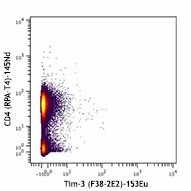
-

Human PBMCs were incubated for 3 days in media alone (top) or with PHA (bottom). Cells were then stained with 145Nd-anti-CD4 (RPA-T4) and 153Eu-anti-human CD366 (Tim-3, clone F38-2E2). CD3+ T cells are displayed in the analysis. Data provided by DVS Sciences. -

| Cat # | Size | Price | Quantity Check Availability | Save | ||
|---|---|---|---|---|---|---|
| 345019 | 100 µg | 207€ | ||||
CD366 (Tim-3) is a transmembrane protein also known as T cell immunoglobulin and mucin domain containing protein-3. Tim-3 is expressed at high levels on activated T cells (preferentially on Th1 cells, monocytes/macrophages, and dendritic cells). Tim-3 has also been shown to exist as a soluble protein. Cells expressing Tim-3 are present at high levels in the CNS of animals at the onset of experimental autoimmune encephalomyelitis (EAE), a disease mediated by lymphocytes secreting Th1-like cytokines. Tim-3 has been proposed to inhibit Th1-mediated immune responses and promote immunological tolerance.
Product DetailsProduct Details
- Verified Reactivity
- Human
- Antibody Type
- Monoclonal
- Host Species
- Mouse
- Immunogen
- Human Tim-3 fusion protein
- Formulation
- Phosphate-buffered solution, pH 7.2, containing 0.09% sodium azide and EDTA.
- Preparation
- The antibody was purified by affinity chromatography.
- Concentration
- 1.0 mg/ml
- Storage & Handling
- The antibody solution should be stored undiluted between 2°C and 8°C.
- Application
-
FC - Quality tested
CyTOF® - Verified - Recommended Usage
-
This product is suitable for use with the Maxpar® Metal Labeling Kits. For metal labeling using Maxpar® Ready antibodies, proceed directly to the step to Partially Reduce the Antibody by adding 100 µl of Maxpar® Ready antibody to 100 µl of 4 mM TCEP-R in a 50 kDa filter and continue with the protocol. Always refer to the latest version of Maxpar® User Guide when conjugating Maxpar® Ready antibodies.
- Application Notes
-
Additional reported applications (for relevant formats of this clone) include: costimulation1 (clone 2E2 has been shown to enhance T-cell receptor mediated activation and cytokine secretion) and blocking2,3.
- Additional Product Notes
-
Maxpar® is a registered trademark of Standard BioTools Inc.
-
Application References
(PubMed link indicates BioLegend citation) -
- Hastings WD, et al. 2009. Eur. J. Immunol. 39:2492. (Costim)
- Jones RB, et al. 2008. J. Exp. Med. 205:2763. (Block)
- Klibi J, et al 2009. Blood 113:1957. (FC, Block)
- Product Citations
-
- RRID
-
AB_2563790 (BioLegend Cat. No. 345019)
Antigen Details
- Structure
- Transmembrane protein containing immunoglobulin domain and mucin-like domain; can exist as a soluble form lacking mucin and transmembrane domains
- Distribution
-
Activated T cells, preferentially on Th1 cells, monocytes, dendritic cells
- Function
- Plays a role in regulating macrophage activation, T cell apoptosis and immune tolerance
- Ligand/Receptor
- Galectin-9
- Cell Type
- Dendritic cells, Monocytes, T cells, Th1, Tregs
- Biology Area
- Immunology, Inhibitory Molecules
- Molecular Family
- CD Molecules, Immune Checkpoint Receptors
- Antigen References
-
1. Hafler DA and Kuchroo V. 2008. J. Exp. Med. 205:2699.
2. Zhu C, et al. 2005. Nat. Immunol. 6:1245.
3. Wang F, et al. 2009. Immunobiology 214:342. - Gene ID
- 84868 View all products for this Gene ID
- Specificity (DOES NOT SHOW ON TDS):
- CD366
- Specificity Alt (DOES NOT SHOW ON TDS):
- CD366
- App Abbreviation (DOES NOT SHOW ON TDS):
- FC,CyTOF®
- UniProt
- View information about CD366 on UniProt.org
Related Pages & Pathways
Pages
Related FAQs
- Can I obtain CyTOF data related to your Maxpar® Ready antibody clones?
-
We do not test our antibodies by mass cytometry or on a CyTOF machine in-house. The data displayed on our website is provided by Fluidigm®. Please contact Fluidigm® directly for additional data and further details.
- Can I use Maxpar® Ready format clones for flow cytometry staining?
-
We have not tested the Maxpar® Ready antibodies formulated in solution containing EDTA for flow cytometry staining. While it is likely that this will work in majority of the situations, it is best to use the non-EDTA formulated version of the same clone for flow cytometry testing. The presence of EDTA in some situations might negatively affect staining.
- I am having difficulty observing a signal after conjugating a metal tag to your Maxpar® antibody. Please help troubleshoot.
-
We only supply the antibody and not test that in house. Please contact Fluidigm® directly for troubleshooting advice: http://techsupport.fluidigm.com/
- Is there a difference between buffer formulations related to Maxpar® Ready and purified format antibodies?
-
The Maxpar® Ready format antibody clones are formulated in Phosphate-buffered solution, pH 7.2, containing 0.09% sodium azide and EDTA. The regular purified format clones are formulated in solution that does not contain any EDTA. Both formulations are however without any extra carrier proteins.
Other Formats
View All CD366 Reagents Request Custom ConjugationCustomers Also Purchased
Compare Data Across All Formats
This data display is provided for general comparisons between formats.
Your actual data may vary due to variations in samples, target cells, instruments and their settings, staining conditions, and other factors.
If you need assistance with selecting the best format contact our expert technical support team.
-
Purified anti-human CD366 (Tim-3)
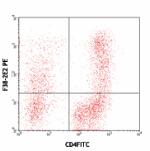
Th1 polarized human peripheral blood mononuclear cells stain... 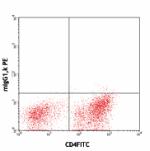
-
PE anti-human CD366 (Tim-3)

Th1-polarized human peripheral blood mononuclear cells were ... 
-
Brilliant Violet 421™ anti-human CD366 (Tim-3)
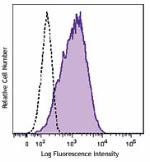
Th1-polarized human peripheral blood lymphocytes were staine... -
Ultra-LEAF™ Purified anti-human CD366 (Tim-3)
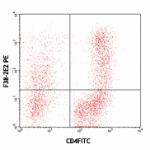
Th1-polarized human peripheral blood mononuclear cells were ... 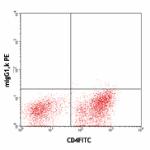
-
APC anti-human CD366 (Tim-3)
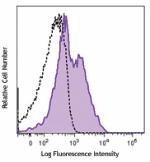
Th1-polarized cells from human peripheral blood mononuclear ... -
PE/Cyanine7 anti-human CD366 (Tim-3)
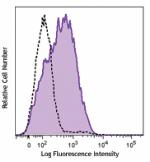
Th1-polarized cells from human peripheral blood mononuclear ... -
PerCP/Cyanine5.5 anti-human CD366 (Tim-3)
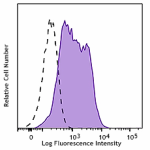
PHA-stimulated (3-day) human peripheral blood lymphocytes we... -
Brilliant Violet 605™ anti-human CD366 (Tim-3)
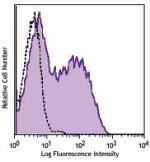
PHA-stimulated (3 days) human peripheral blood lymphocytes w... -
FITC anti-human CD366 (Tim-3)
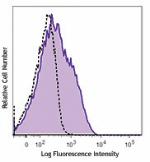
PHA-stimulated (3 days) human peripheral blood lymphocytes w... -
Purified anti-human CD366 (Tim-3) (Maxpar® Ready)
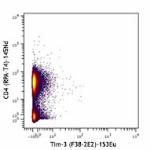
Human PBMCs were incubated for 3 days in media alone (top) o... 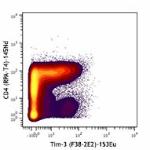
-
Brilliant Violet 711™ anti-human CD366 (Tim-3)
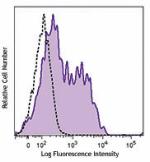
PHA-stimulated (3 days) human peripheral blood lymphocytes w... -
APC/Cyanine7 anti-human CD366 (Tim-3)
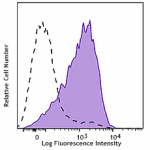
PHA-stimulated (three days) human peripheral blood lymphocyt... -
Brilliant Violet 785™ anti-human CD366 (Tim-3)
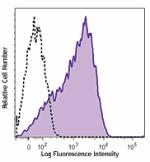
PHA-stimulated (three days) human peripheral blood lymphocyt... -
Brilliant Violet 650™ anti-human CD366 (Tim-3)
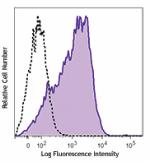
PHA-stimulated (three days) human peripheral blood lymphocyt... -
Brilliant Violet 510™ anti-human CD366 (Tim-3)
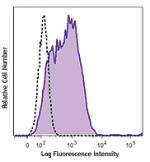
PHA-stimulated (three days) human peripheral blood lymphocyt... -
PE/Dazzle™ 594 anti-human CD366 (Tim-3)
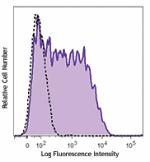
PHA-stimulated (three days) human peripheral blood lymphocyt... -
GoInVivo™ Purified anti-human CD366 (Tim-3)
-
APC/Fire™ 750 anti-human CD366 (Tim-3)
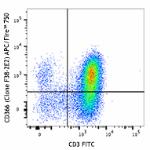
PHA-stimulated (3 days) human peripheral blood lymphocytes w... 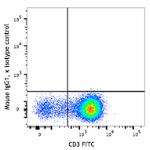
-
Pacific Blue™ anti-human CD366 (Tim-3)
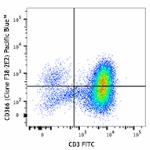
PHA-stimulated (3 days) human peripheral blood lymphocytes w... 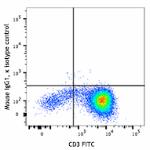
-
Biotin anti-human CD366 (Tim-3)

PHA-stimulated (3 days) human peripheral blood lymphocytes w... -
TotalSeq™-A0169 anti-human CD366 (Tim-3)
-
TotalSeq™-C0169 anti-human CD366 (Tim-3)
-
PE/Cyanine5 anti-human CD366 (Tim-3)
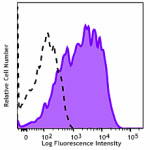
PHA-activated human PBMCs (3 days) were stained with anti-hu... -
TotalSeq™-B0169 anti-human CD366 (Tim-3)
-
Brilliant Violet 750™ anti-human CD366 (Tim-3) Antibody
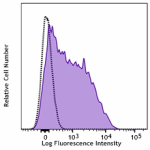
PHA-activated human PBMCs (3 days) stained with anti-human C... -
TotalSeq™-D0169 anti-human CD366 (Tim-3)
-
PE/Fire™ 810 anti-human CD366 (Tim-3)

Human peripheral blood mononuclear cells stimulated (3 days)... -
PE/Fire™ 640 anti-human CD366 (Tim-3)

PHA-stimulated (3 days) human peripheral blood monocytes wer... -
PE/Fire™ 700 anti-human CD366 (Tim-3)

PHA-stimulated (3 days) human peripheral blood lymphocytes w...

 Login / Register
Login / Register 










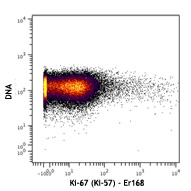
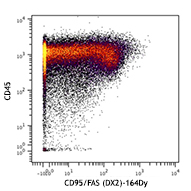
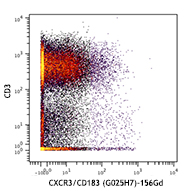
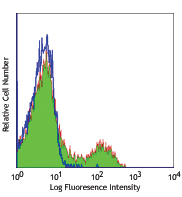



Follow Us